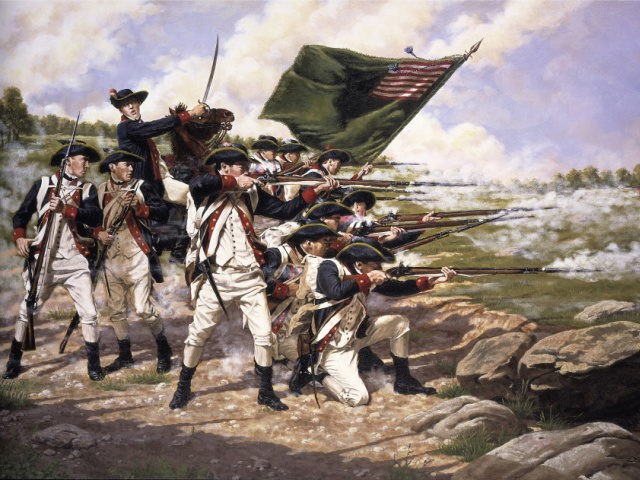Two hundred and forty-five years ago, in a forgotten battle that saved Washington’s Army, a handful of American soldiers accomplished a feat exceptionally rare in history. They successfully prevented an amphibious landing by thousands of British soldiers.
On October 12, 1776, while crouching behind a woodpile, Colonel Edward Hand gazed in astonishment at the sea of Redcoats in front of him. Married to an American, the Irish immigrant doctor had resigned his position as a surgeon’s mate in the British Army immediately before the Revolution began in 1774 and thrown his support to the Patriot cause. Although he and his twenty-five expert marksmen faced more than four thousand British Redcoats intent on landing, Colonel Hand maintained his composure.
Under cover of the morning fog, Lord William Howe had transported his troops by sea up the Long Island Sound to Throgs Point in the Bronx in hopes of trapping the Continental Army in Manhattan after the Battle of Harlem Heights. Fortunately for the Americans, high tide made the peninsula more of an island. To step foot on the mainland, the troops had to cross either a single bridge or a narrow strip of land wide enough for only one or two men at a time.
As soon as the Continentals realized British intentions, they quickly tore up the wooden planks on the bridge, leaving only the causeway to connect the point to the Bronx. A woodpile near the far end of the causeway provided cover, and Hand and his men took full advantage of it. The marksmen picked off the British soldiers one by one as they attempted to cross. Officers, in particular, remained in the riflemen’s sights.
Methodically, the men went through the tedious process of loading and firing their rifles, timing their shots so that someone was always ready to fire on the British troops as they attempted to cross the narrow causeway spanning the marsh in front of them. Small puffs of smoke rose in the air, and the acrid smell of gunpowder infiltrated his nostrils while rifles cracked on either side of him. Taking a scrap of parchment from his pocket, Hand dashed off a note requesting reinforcements and tasked a messenger with delivering it to Washington. He then picked up his weapon and joined his men in their ceaseless efforts to fend off the enemy.
After scrambling out of their eighteenth-century versions of landing craft, the British moved inland. A British officer recorded in his diary that they marched forward until they came a bridge and dam where a small party of Rebels opposed them.
Colonel Hand and his small detachment of Pennsylvania riflemen had been stationed there to guard against such an attempt. Still, they never imagined that the two dozen of them would need to hold off an army. Miraculously, Hand and his crack riflemen managed to check Henry Clinton’s forces long enough for reinforcements. Later that day, 1,800 Massachusetts and New York Continentals arrived, bringing with them two cannon. Those additional Americans included the Marbleheaders.
The full story now told in the new bestselling book, The Indispensables: Marblehead’s Diverse Soldier-Mariners Who Shaped the Country, Formed the Navy, and Rowed Washington Across the Delaware. The book is a Band of Brothers-style treatment of the regiment and the leading revolutionary citizens from Marblehead, a unique largely unknown group of Americans who changed the course of history.
Over the next six days, Clinton made several attempts to traverse the bottleneck; however, the Patriots stymied him every time. On October 12, another American brigade arrived, and Howe decided to try a different tack. Despite his failure at Throgs Neck, he did not give up on his plan. Howe loaded his men back onto their vessels and headed roughly five miles up Long Island Sound to Pell’s Point, from where he could travel down the Eastchester Road to King’s Bridge and trap Washington’s army. Yet, once again, they would encounter the Marblehead brigade which would change the course of history.
Patrick K. O’Donnell is a bestselling, critically acclaimed military historian and an expert on elite units. He is the author of twelve books, including The Indispensables, which is featured nationally at Barnes & Noble, Washington’s Immortals, and The Unknowns. O’Donnell served as a combat historian in a Marine rifle platoon during the Battle of Fallujah and often speaks on espionage, special operations, and counterinsurgency. He has provided historical consulting for DreamWorks’ award-winning miniseries Band of Brothers and documentaries produced by the BBC, the History Channel, and Discovery. PatrickODonnell.com @combathistorian

COMMENTS
Please let us know if you're having issues with commenting.